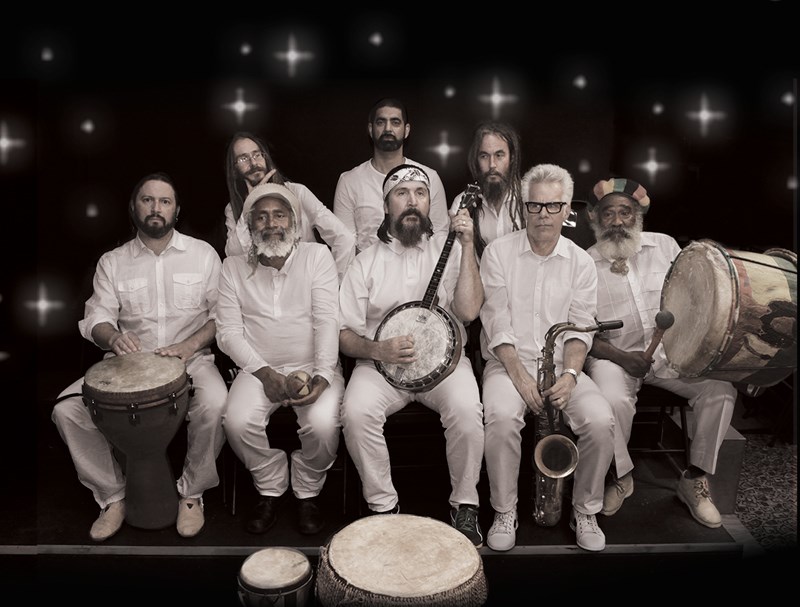
Five years ago Big Sugar came back from the dead—or more accurately a decade-long hiatus—with a new album and new energy. It was a revival that brought back the Big Sugar sound that many fans loved.
But when their next album dropped in 2014, it was something a little different. Yardstyle was unplugged, in the truest sense of the word. The all-acoustic record featured an augmented and turned down Big Sugar, tapping into the band's reggae roots: wooden instruments, a nyabinghi drum and some old-time reggae musicians.
“Some of our instruments still have fur on them. I’m not kidding, it’s like ‘oh wow, there’s hair on this,’ and I think you can hear that,” lead singer Gordie Johnson said of the Big Sugar ensemble. “Some of these instrument are nearly 100 years old, and some of the guys playing them, they are our elders that we’ve brought on stage with us.”
The whole album came about almost on a whim. Johnson normally just grabs a banjo and does radio and TV spots by himself, but for whatever reason on their last tour, guys started tagging along, bringing drums and horns and harmonicas.
“And we were doing that all day, every day, and one day we just looked at one another and kind of said, ‘can you imagine if this was the whole tour? How much fun is this?’”
So they headed to a Toronto studio, put out an open call to their friends and past collaborators, and for three days sat and played music. To hear Johnson tell it, they dug up some old tunes from their catalogue, played some old reggae classics, even tried out some rarer tunes.
“We put the word out, and we had like the Rasta elders coming out of the woodwork, you know, guys that we played with for years and years, songwriting partners that I’ve had. Guys just started showing up at the studio, so at any time we always had about 12 people around the mikes,” Johnson said.
And most of that group hit the road when Big Sugar took the album on tour. Johnson said that every night there’s at least eight people on stage with him. They play in churches, community halls and theatres, and Johnson said they’re having a blast.
Not only does he have a more direct line to his audience, he also gets to play with some of his oldest songs, seeing how they fit into a new format.
“Being the format that it is, every night we’re discovering new stuff from the catalogue to go ‘oh, what about this one.’ There are some songs that they’ve been electrified for so long that I’ve kind of forgot where they started, and we’re digging them up again.
“It’s kind of cool to hear the whole band respond to it again like it’s the first time.”
The band is using this tour to help send Ethiopian children to school, in partnership with World Vision. So, instead of selling merch at their shows, the band asks its fans to sponsor a child, and gives them some swag as incentive.
“It really gives us purpose every day beyond just: ‘hey let’s go out and play our songs,’” Johnson said.
“All the talk about one love and all this stuff, it’s all just good reggae music unless you’re doing the stuff you’re singing about.”
Trevor Nichols
[email protected]
